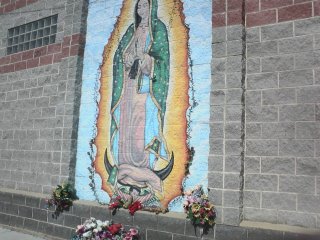Our Lady of Spark Plugs

The side of Vera's Auto Repair in Pilsen has an image of the Virgen of Guadalupe painted on the brick. I like to think that people idle for a moment before pulling their cars into the shop to beseech the Virgen to save their transmission.
When I dropped off my car for an oil change, I noticed that one of the mechanics at Vera's has a perfectly executed cursive tattoo running the length of his forearm. I've seen many similar tattoos; often they spell a woman's name. This one said "Mexico." This wasn't surprising, because I know how much pride (in my view deserved) many Mexicans take in their homeland. But I did wonder what particular series of experiences would have motivated this mechanic to tattoo "Mexico" on his arm. I would have asked, but he was busy working on someone else's car. Since he was speaking fluent Spanish, I guessed that he had grown up in Mexico, though I could be wrong. It seems unlikely, however, that a person actually living in Mexico would feel the need to tattoo himself with his nationality. Rather, like the Sicilians who discovered they were "Italian" after coming to the US at the turn of the century, he probably felt more "Mexican" after coming to Chicago and got the tattoo here. But why label himself as such so defiantly? Was the tattoo a response to an encounter in which his nationality had been disparaged? Did he feel the need to demonstrate his Mexican pride after feeling dismissed or invisible or beat-down while working tough jobs for little pay here? How many years of living in Chicago did it take for those feelings to develop? Or was the tattoo just expressing high hopes for the Mexican national team in the 2006 World Cup?

2 Comments:
Perhaps its "mexican" as opposed to Puerto Rican? The two are often in conflict in Chicago.
I thought about that, but it seems more likely for someone Puerto Rican to want to distinguish him or herself from Mexicans in Chicago. In Pilsen, Mexicans vastly outnumber Puerto Ricans, so Puerto Ricans are less of a population of reference. There are only a few Puerto Ricans who live in our neighborhood. In Humbolt Park, on the other hand, Mexicans outnumber Puerto Ricans even in what has since the 1950s been the area with the greatest concentration of Puerto Ricans. Thus, Mexicans are probably more frequently invoked by Puerto Ricans than vice-versa. For more on relationships between these two groups, see:
Latino Crossings: Mexicans, Puerto Ricans, and the Politics of Race and Citizenship, by Nick De Genova and Ana Ramos Zayas.
or
Latino Ethnic Consciousness: The Case of Mexican Americans and Puerto Ricans in Chicago, by Felix Padilla.
Post a Comment
<< Home